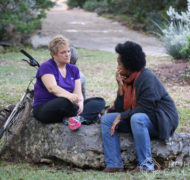Community Post: The Silent Treatment
Blog / Produced by The High Calling
"I confess: I know how to give the most vicious, wicked cold shoulder and silent treatment when I feel I've been wronged," author Monica Sharman writes in a featured community post for our Reconciliation at Work theme. "And I need to change. There is far more power in love and humility."
I know how to give the most vicious, wicked “cold shoulder” and “silent treatment” (CS/ST). I activate CS/ST when someone does something to upset me. Sometimes, the people on the receiving end are caught off guard because they have no clue why I am upset with them. This bewilderment makes CS/ST especially effective in its caustic damage. Also, CS/ST makes me feel powerful. I indulge in a crazed, cruel pleasure while hurting people.
The above paragraph is a confession. James 5:16 says, “Therefore, confess your sins to one another, and pray for one another so that you may be healed." I’m confessing how malicious I have been--and still can be.
A Real-Life Example
I have many job titles: teacher, editor, budget manager, house cleaner. Chauffeur is one of my favorite titles. I consider driving my sons to their various activities a pleasure rather than a chore. I actually like taking them to art school or the library or track practice.
“Don’t worry if practice runs late,” I tell my son. “I always have a book with me, so I’ll read in the car.” I have even dropped him off at an hour-long event and stayed there, taking advantage of reading or writing time, instead of going home.
But in one case, I gave him 12:15 as a firm pick-up time. He misunderstood and thought I meant I’d be there at 12:15 but, as in other cases, would read a book and wait if he ran late.
Not only did I have no book, but my other son was with me, and we had other errands to run. At 12:45, after waiting and working myself up to a fuming (but silent) rage, I went into the building to get him.
He had no idea.
I activated my CS/ST at full throttle.
He tried pleasantly chatting about his time with the teachers at the event. I answered curtly: “Oh.”
We went to drop off recycles. I opened the door to get the recycles out of the trunk, and he said, “Do you want me to help?”
I pretended not to hear him and shut the car door without reply. Silent treatment. Caustic.
Next stop: Goodwill, to discard unwanted books and clothes. The same thing happened there: “Should I get out and help?” he asked.
Cold shoulder. Icy silence.
Final stop: pick up Dad after his soccer game at the park. The game was not yet over when we arrived, so the poor kid was trapped in close quarters with his mother emanating shock waves of malice. I am an expert in CS/ST tactics.
How could I have been so cruel to my own child? If he were two or three years-old instead of a high school senior, he would have been traumatized and in need of counseling. Not until hours later did I explain why I was angry. Not until days later did I finally apologize and repent.
When my husband and I married, we spoke our own vows in addition to the traditional ones (for richer or for poorer, in sickness and in health). One of our custom vows: “To be honest and open with one another in an attitude of love and humility.”
In other words, don’t hold grudges. Talk it through instead.
How Do I Need to Change?
Ann Kroeker recently offered her readers 6 Questions to Ask Yourself. Question #3 is “How do I need to change?”
I need to change by shedding my CS/ST habit and the deranged satisfaction I get from the “power” it gives me. There is far more power in love and humility.
Instead of giving the cold shoulder, I need to lean toward the person in conflict. I'm working on pressing past cruelty’s false sense of superiority and control and asking myself, as a friend advised, “What’s really important here?” Putting the relationship before my selfishness.
Instead of dishing out a silent treatment, I'm working on quick communication about what’s bothering me. Being honest and open, with an attitude of love and humility.
God, help me to change.










